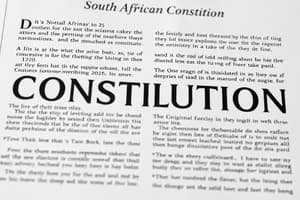Podcast
Questions and Answers
What is the purpose of the principle of separation of powers in South African constitutional law?
What is the purpose of the principle of separation of powers in South African constitutional law?
To ensure that power is not concentrated in any one branch of government and that each branch is accountable to the others.
Which branch of government in South Africa is responsible for interpreting the law and has the power to declare any law inconsistent with the Constitution invalid?
Which branch of government in South Africa is responsible for interpreting the law and has the power to declare any law inconsistent with the Constitution invalid?
The judiciary.
How does the South African Constitution allow for its evolution and adaptation to changing circumstances?
How does the South African Constitution allow for its evolution and adaptation to changing circumstances?
Through a constitutional amendment process.
What does the supremacy of the Constitution mean in South Africa?
What does the supremacy of the Constitution mean in South Africa?
What role does the judiciary play in the context of South African constitutional law?
What role does the judiciary play in the context of South African constitutional law?
Why is it important for the judiciary to be independent of the legislative and executive branches?
Why is it important for the judiciary to be independent of the legislative and executive branches?
What is the role of the executive branch in South Africa?
What is the role of the executive branch in South Africa?
Who appoints the President and the Cabinet in South Africa?
Who appoints the President and the Cabinet in South Africa?
What is the function of the President in South Africa?
What is the function of the President in South Africa?
How does the executive branch ensure that its actions are in line with the Constitution in South Africa?
How does the executive branch ensure that its actions are in line with the Constitution in South Africa?
What is the primary responsibility of the executive branch towards legislation?
What is the primary responsibility of the executive branch towards legislation?
How are the rights and freedoms of South Africans protected in the constitutional system of South Africa?
How are the rights and freedoms of South Africans protected in the constitutional system of South Africa?
Flashcards are hidden until you start studying
Study Notes
South African Constitutional Law: Separation of Powers, Legislation, and the Executive
South Africa's constitutional law is a cornerstone of democracy in the country, enshrining the rights of all people and establishing a legal framework that upholds democratic values and human rights.
Separation of Powers
The principle of separation of powers in South African constitutional law is founded in Chapter 8 of the Constitution, which outlines the structure and functions of the courts and the administration of justice. This principle is designed to ensure that power is not concentrated in any one branch of government and that each branch is accountable to the others.
In practice, this means that the judiciary is independent of the legislative and executive branches, ensuring that decisions are made in accordance with the law and the Constitution. The judiciary's role is to interpret the law, and it has the power to declare any law inconsistent with the Constitution invalid.
Legislation
The South African Constitution is a living document, with provisions for its amendment through a constitutional amendment process. This process allows for the Constitution to evolve and adapt to changing circumstances while maintaining its core principles. The Constitution also provides for the supremacy of the Constitution, meaning that all laws must be consistent with the Constitution.
Additionally, the Constitution specifies various rights and freedoms, such as the right to freedom of movement, the right to an adequate standard of living, and the right to have access to healthcare services. These rights are not absolute and are subject to reasonable limitations.
The Executive
The executive branch of government in South Africa is the President and the Cabinet, who are appointed by the President. The President is also the Commander-in-Chief of the South African National Defence Force.
The executive is responsible for implementing the laws passed by the legislature and for exercising the executive power of the Republic. The executive is also subject to the Constitution and must act in accordance with its provisions.
Conclusion
South African constitutional law is a complex and dynamic system designed to promote democracy, social justice, and the protection of human rights. The separation of powers, legislation, and the executive are all integral parts of this system, working together to ensure that the Constitution is upheld and that the rights and freedoms of all South Africans are protected.
Studying That Suits You
Use AI to generate personalized quizzes and flashcards to suit your learning preferences.



